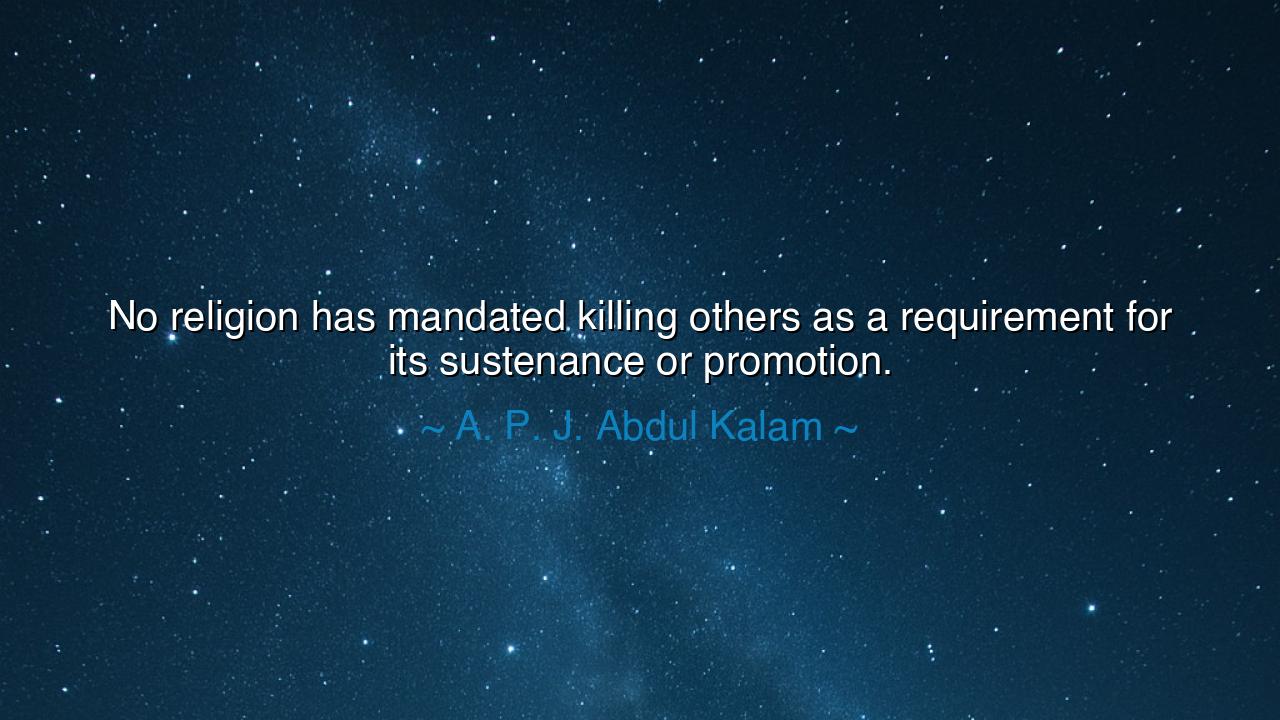
No religion has mandated killing others as a requirement for its
No religion has mandated killing others as a requirement for its sustenance or promotion.






“No religion has mandated killing others as a requirement for its sustenance or promotion.” – A. P. J. Abdul Kalam
In these solemn and radiant words, A. P. J. Abdul Kalam, the “People’s President” and philosopher of peace, speaks not merely as a scientist or statesman, but as a sage of the human spirit. His voice, calm yet powerful, calls us to remember the sacred origin of religion—not as a banner for bloodshed, but as a bridge between souls. When he declares that no religion has ever demanded killing others for its survival, he is defending the divine essence of faith itself. Religion, in its purest form, is a song of love and compassion; violence in its name is a distortion, a shadow cast by human ignorance and fear.
The origin of this truth lies in the wisdom of all great prophets and teachers who have walked the earth. From the serene smile of the Buddha to the mercy of the Prophet Muhammad, from the compassion of Christ to the ahimsa of Mahavira, every founder of faith spoke of peace, not conquest. Their message was not one of sustenance through blood, but of flourishing through kindness and understanding. And yet, through the ages, men have wrapped swords in scripture, forgetting that God needs no defender armed with hate. Dr. Kalam’s words pierce through that fog of delusion, reminding humanity that the divine does not dwell in destruction.
The unrest of the world—its wars, its divisions, its cruelty—has often been justified under the banner of faith. But Kalam, like a guardian of conscience, strips away this falsehood. He tells us that when religion turns to violence, it ceases to be religion. It becomes fanaticism, a creature born not of heaven but of the corrupted heart of man. The true believer does not destroy in God’s name; he heals. The true follower does not impose his truth by force; he lives it so purely that it awakens truth in others.
History bears witness to this eternal conflict between the spirit of faith and the corruption of power. Consider the reign of Ashoka the Great, the warrior emperor of India. Once he bathed his empire in blood, conquering the kingdom of Kalinga with unimaginable slaughter. But afterward, as he walked among the dead and heard the cries of the widows, his heart shattered. In that moment of revelation, he turned to Buddhism, not as conquest but as confession. Ashoka cast aside his sword and vowed to rule through dharma, the law of compassion. His edicts carved into stone proclaimed what Kalam would later echo: that no religion, no truth, requires killing to endure—it endures through the love that gives life.
To kill in the name of God is to deny God Himself. For what Creator would rejoice in the destruction of His creation? Kalam’s words resound as both a plea and a prophecy: that mankind’s survival depends not on power, but on understanding; not on the dominance of one faith, but on the harmony of all. When we recognize that every religion speaks of the same light through different lamps, the illusion of division dissolves. The sustenance of faith is not in the conquest of others, but in the cultivation of the soul.
Yet, this message is not meant to comfort only—it is meant to awaken. For peace is not a passive state; it is a labor of courage. It requires us to speak against hatred even when it masquerades as holiness. It asks us to act, to build bridges where others raise walls, to teach our children that no heaven is reached through another’s suffering. To be religious, in the truest sense, is not to defend God but to reflect Him—to be a vessel of love, mercy, and forgiveness in a fractured world.
So, my child of faith and reason, remember the wisdom of this humble man who dreamed of unity. When you see violence cloaked in devotion, know that it is a lie. When you hear voices calling for division, remember that they speak not for God, but for their own darkness. Let your heart be your temple and your compassion your creed. For the day humanity remembers that no religion mandates killing, that love, not fear, is the breath of the divine—that will be the day when war ends, and the true spirit of worship begins.






AAdministratorAdministrator
Welcome, honored guests. Please leave a comment, we will respond soon